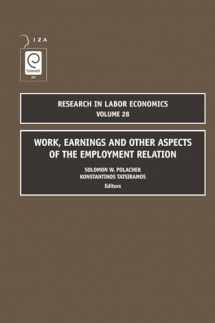
Work, Earnings and Other Aspects of the Employment Relation (Research in Labor Economics, 28)
Book details
Summary
Description
This volume contains 13 new and important never before published chapters covering aspects of the employer-employee relationship. The volume is focused at the academic audience, but is also geared to government and business policy makers worldwide. The chapters use data from the US, Europe, Asia, and the Middle-East to answer a number of vital labor market questions. These include: Why has part-time work increased so dramatically in the 15 European Union countries? What changes in retirement behavior will be expected as countries change pension laws? Why do firms often use fixed-term instead of long-term employment contracts? How do employee work interruptions affect occupational choice? Why do both employers and employees often prefer additional fringe benefits to wage increases? Do academic certifications really signal higher worker quality? How is an individual's work ethic influenced by others in residential neighborhoods? And, why do risky jobs often pay lower wages when one might expect employees need better remuneration to take dangerous jobs?


We would LOVE it if you could help us and other readers by reviewing the book
Book review



